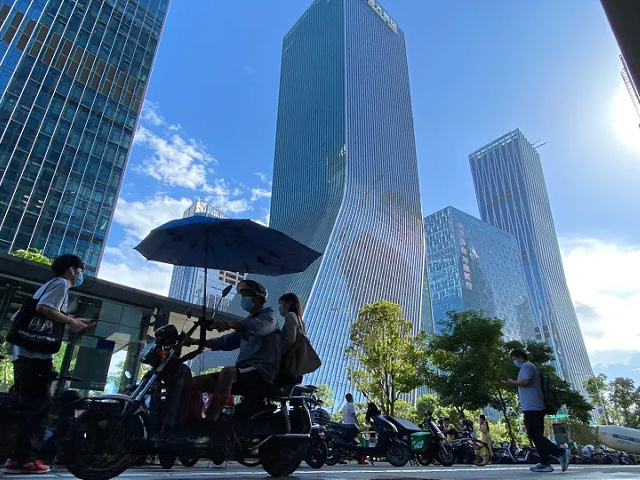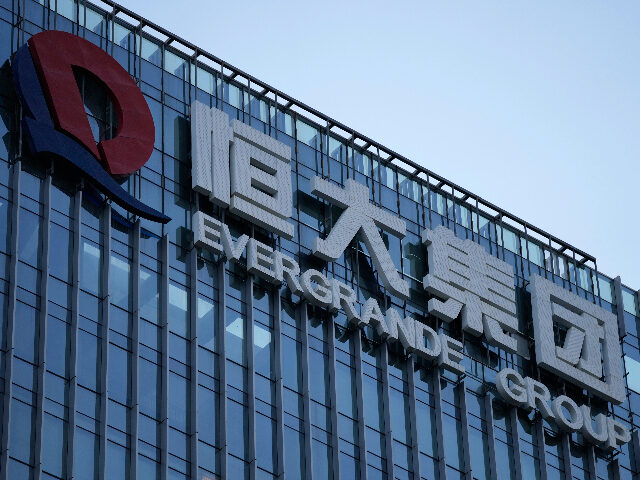China’s securities regulating agency announced on Monday that it had banned the founder of real estate giant Evergrande from the securities market and accused the company of $78 billion fraud.
Evergrande was once one of China’s largest and most reliable corporations, fueling a boom in the real estate market that led many middle-class Chinese to invest in the construction of new homes. Evergrande and similar companies never built those homes, taking the money and claiming that “cash flow” problems made it impossible to finance construction.
As a result, homebuyers stopped paying their mortgages in protest beginning in 2022, and protests began occurring in some of the regions most affected by the real estate failures, most prominently Henan province, where angry investors have stormed banks demanding their investments back on multiple occasions. On one occasion in September 2021, angry Evergrande investors stormed the company’s offices demanding their money back.
The real estate market’s failures coupled with significant damage to China’s manufacturing and small business sectors as a result of the brutal “zero-Covid” lockdown and quarantine camp policy have wounded the nation’s economy and sent foreign investment fleeing to states such as India. China reported its first-ever quarterly decline in foreign direct investment for the quarter ending in September 2023.
Evergrande is believed to hold over $300 billion in liabilities, making it one of the most indebted countries in the world. In January, a court in Hong Kong ordered the corporation to liquidate. The Chinese Communist Party disappeared its founder, Hui Ka Yan, in September, placing him “under police control” at an unknown “designated location.” He has not appeared in the public eye since.

File/Residents pass near the headquarters for Evergrande in Shenzhen in southern China, Thursday, Sept. 23, 2021. The troubled Chinese real estate developer with $310 billion of debt is asking investors in one of its bonds to postpone when they will be repaid. (AP Photo/Ng Han Guan, File)
During the time of Hui’s disappearance, Chinese police raided the offices of Evergrande’s financial services arm, arresting several top employees. Reports indicated only vaguely that the Communist Party suspected Evergrande of failing to properly disclose its revenue and liabilities.
Adding to the intrigue, in October, pro-communist billionaire Wong Hongsheng published a video screed on the regime-controlled site WeChat condemning Hui as an “enemy of the Chinese people” and warning other Chinese business magnates to avoid his fate.
“It is despicable that Hui has chosen to be the enemy of the Chinese people … by applying for the bankruptcy protection in the U.S. so he can leverage the confrontation between China and the US and hide his wealth,” Wong reportedly said, as translated by the South China Morning Post (SCMP).
“All of us entrepreneurs should take this as a warning. When we face difficulties, we should try our best to resolve them on our own. You can’t play a deceptive game to protect your wealth, and let the country and the people suffer,” he continued.
The announcement on Monday of Hui’s lifetime ban from securities trading shed some light into China’s potential criminal charges against him and Evergrande. According to the state-run Global Times propaganda outlet, the China Securities Regulatory Commission (CSRC) accused him of “deciding and organizing financial fraud with particularly malicious means that have had severe consequences, according to the CSRC.”
Specifically, Beijing is accusing Hui of “inflating income in Evergrande Real Estate’s annual reports for 2019 and 2020 which amounted to 564 billion yuan,” or over $78 billion. The Chinese government claims Evergrande used those false reportings to secure corporate bonds and conduct other business which would have been impossible had it not documented such large revenues.
Hui will no longer be allowed to be active in the securities market and received a $6.53 million fine “for his involvement in serious financial fraud.”

The near deserted Evergrande City Plaza shopping mall, developed by China Evergrande Group, in Beijing, China, on Wednesday, Jan. 31, 2024. China Evergrande Group creditors are set to recover just a fraction of the billions of dollars worth of the builder’s debt they hold, with most of its assets likely hard to access for liquidators. Source: Bloomberg
Another senior Evergrande executive, former vice chairman Xia Haijun, similarly was banned for life from trading in securities and was ordered to pay $2 million. Evergrande itself was fined $580 million.
Bloomberg observed on Tuesday that the $78 billion alleged fraud is one of the largest such cases in history, dwarfing cases such as the Enron scandal.
“A Bloomberg gauge of China developer stocks dropped as much as 1.1% in early trading on Tuesday, taking losses to 54% in the past year,” the outlet reported.
The accusations appear to be an attempt by the Chinese Communist Party to show foreign investors that it has a robust mechanism for punishing and eliminating fraud and that their money is safe in the country. Party officials prioritized foreign messaging in this direction during this month’s “two sessions,” the annual gathering of the National People’s Congress (NPC), China’s rubber-stamp communist legislature, and the Chinese People’s Political Consultative Conference (CPPCC), an advisory body made up of Party elites and their friends. In his address to the opening of the sessions, genocidal dictator Xi Jinping emphasized the development of what the Party is calling “new quality productive forces,” the development of new industries in futuristic sectors yet unknown.
Xi also demanded his Party do more to underpin the foundations of the economy, such as manufacturing and real estate, to ensure a friendly environment for foreign investors.
“It is necessary to prevent a headlong rush into projects and the formation of industry bubbles, and avoid adopting just a single model of development,” Xi reportedly said, according to state media.
“We must prevent local rush and oppose irrational, blind investments that create bubbles,” the South China Morning Post quoted him as saying. “Promoting new productive forces doesn’t mean neglecting or giving up traditional industries.”
Follow Frances Martel on Facebook and Twitter.

COMMENTS
Please let us know if you're having issues with commenting.